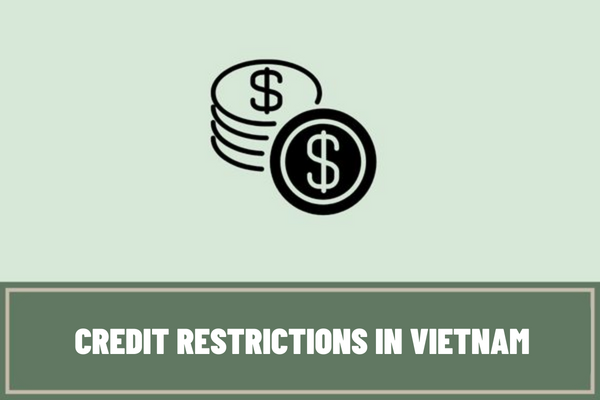What are the cases of credit restrictions in Vietnam? What are the current regulations on cases of ineligibility for credit extension in Vietnam?
What is credit extension in Vietnam?
According to the provisions of Clause 14, Article 4 of the 2010 Law on Credit Institutions in Vietnam, credit extension means an agreement allowing an organization or individual to use a sum of money or a commitment allowing the use of a sum of money on the repayment principle by such professional operations as lending, discount, financial leasing, factoring, bank guarantee and other credit extension operations.

What are the cases of credit restrictions in Vietnam? What are the current regulations on cases of ineligibility for credit extension in Vietnam?
What are the cases of credit restrictions in Vietnam?
Pursuant to Article 127 of the 2010 Law on Credit Institutions in Vietnam, (amended and supplemented by Clause 20, Article 1 of the 2017 Law on Amendments to some Articles of the Law on Credit Institutions in Vietnam) stipulating credit restrictions as follows:
- A credit institution or foreign bank branch may extend neither unsecured credit nor concessional credit to the following entities:
+ The audit institution and auditors that are auditing the credit institution or foreign bank branch; inspectors who are inspecting the credit institution or foreign bank branch;
+ The chief accountant of credit institutions and branches of foreign banks; the president and other members of the Board of Directors, the head and other members of the Board of Controllers, the Director, Deputy Director and people holding equivalent positions of people's credit funds; (amended by Clause 20, Article 1 of the 2017 Law on Amendments to some Articles of the Law on Credit Institutions in Vietnam)
+ Major shareholders and founding shareholders:
+ An enterprise in which one of the entities specified in Clause 1, Article 126 of the 2010 Law on Credit Institutions in Vietnam owns more than 10% of its charter capital;
+ The person who appraises and approves the credit extension;
+ Subsidiaries and affiliated companies of the credit institution or an enterprise in which the credit institution has the right to control.
- The total outstanding loans provided to the entities defined at Points a, b, c, d and e, Clause 1 Article 127 of the 2010 Law on Credit Institutions in Vietnam must not exceed 5% of a credit institution's or foreign bank branch's own capital.
- Credit extension to the entities defined in Clause 1 Article 127 of the 2010 Law on Credit Institutions in Vietnam must be approved by the Board of Directors or the Members' Council of the credit institution and publicized within the credit institution.
- The total outstanding loans provided to an entity defined at Point f Clause 1 Article 127 of the 2010 Law on Credit Institutions in Vietnam must not exceed 10% of a credit institution's own capital; and the total outstanding loans to all entities defined at Point f Clause 1 Article 127 of the 2010 Law on Credit Institutions in Vietnam must not exceed 20% of a credit institution's own capital.
- The total balance of credit extension mentioned in Clause 2 Article 127 of the 2010 Law on Credit Institutions in Vietnam include the purchase of and investments in corporate bonds issued by the entities specified in Point a, Point b and Point d Clause 1 Article 127 of the 2010 Law on Credit Institutions in Vietnam; the total balance of credit extension mentioned in Clause 4 Article 127 of the 2010 Law on Credit Institutions in Vietnam include the purchase of and investments in bonds issued by the entities specified in Point e Clause 1 Article 127 of the 2010 Law on Credit Institutions in Vietnam.
What are the current regulations on cases of ineligibility for credit extension in Vietnam?
Pursuant to Article 126 of the 2010 Law on Credit Institutions in Vietnam (supplemented by Clause 19, Article 1 of the 2017 Law on Amendments to some Articles of the Law on Credit Institutions in Vietnam), the cases of ineligibility for credit extension are as follows:
- A credit institution or foreign bank branch may not extend credit to the following organizations and individuals:
+ Members of the Board of Directors, Members' Council or Control Board, the Director General (Director). Deputy Director(s) General (Deputy Director(s)) and holders of equivalent posts in the credit institution or foreign bank ranch; legal entities being shareholders whose capital share representatives are members of the Board of Directors or Control Board of the credit institution, for credit institutions being joint-stock companies, or legal entities being capital contributors or owners of the credit institution, for credit institutions being limited liability companies;
+ Parents, spouses and children of members of the Board of Directors, Members' Council or Control Board, the Director General (Director), Deputy Directors General (Deputy Directors) and holders of equivalent posts.
- Provisions of Clause 1 of this Article do not apply to people's credit funds and credit extension in the form of issuance of personal credit cards (amended by Clause 19, Article 1 of the 2017 Law on Amendments to some Articles of the Law on Credit Institutions in Vietnam).
- Credit institutions and foreign bank branches may not extend credit to clients on the basis of guarantee provided by entities specified in Clause 1 of this Article. Credit institutions and foreign bank branches may not provide guarantee in any forms for credit extended to the entities defined in Clause 1 of this Article by other credit institutions.
- Credit institutions may not extend credit to securities trading enterprises in which they have the right to control.
- Credit institutions may not extend credit on the basis of accepting their own securities or securities of their subsidiaries as guarantee.
- A credit institution or foreign bank’s branch must not extend credit for the purpose of contributing capital or buy shares of another credit institution.
- Credit extension specified in Clauses 1, 3, 4, 5, 6 Article 126 of the 2010 Law on Credit Institutions in Vietnam includes purchase of and investments in corporate bonds.
LawNet
